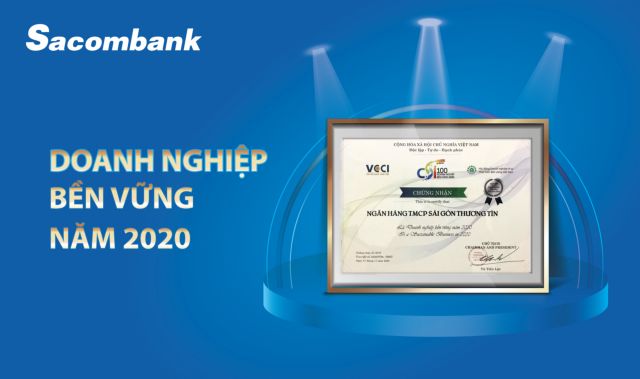Saigon Thuong Tin Commercial Joint Stock Bank (Sacombank) has been named in the list of Top 100 Sustainable Businesses in Viet Nam in 2020 compiled by the Viet Nam Business Council for Sustainable Development and the Viet Nam Chamber of Commerce and Industry.

Saigon Thuong Tin Commercial Joint Stock Bank (Sacombank) has been named in the list of Top 100 Sustainable Businesses in Viet Nam in 2020 compiled by the Viet Nam Business Council for Sustainable Development and the Viet Nam Chamber of Commerce and Industry.
The list is based on the Corporate Sustainable Index, Viet Nam’s first set of indicators in the field of sustainable development, which has more than 100 stringent criteria based on international standards and practices and Viet Nam’s legal regulations.
Sacombank met all the criteria.
As a business in the financial services sector, Sacombank is always aware of the impact of its business activities on society and the environment through providing financial services to partners or projects that have an indirect impact on them.
The bank is also one of the pioneers in building the environmental and social management system (ESMS), and does a regular review of its environmental and social policies and processes.
Besides optimising its business and internal operations, Sacombank also carries out annual community programmes like the ‘Warm Spring’ charity programme, ‘Running for community health with Sacombank,’ the ‘Nurturing dreams’ scholarships, humanitarian blood donation programme ‘Sharing from the heart,’ building sophisticated public toilets, and installing stone benches and chairs in public places.
Sacombank has also actively contributed to building bridges, schools/classrooms, charity houses in mountainous and remote areas, supporting shelters for orphaned and disabled children, helping support Vietnamese Heroic Mothers, contributing to the fight against Covid-19, and mitigating the consequences of natural disasters.
Since 2013 Sacombank has been making a ‘sustainable development report’ in its annual reports.
It is based on the Global Reporting Initiative’s GRI Standards, the most advanced global standard in sustainability reporting, to increase transparency and accountability. — VNS





